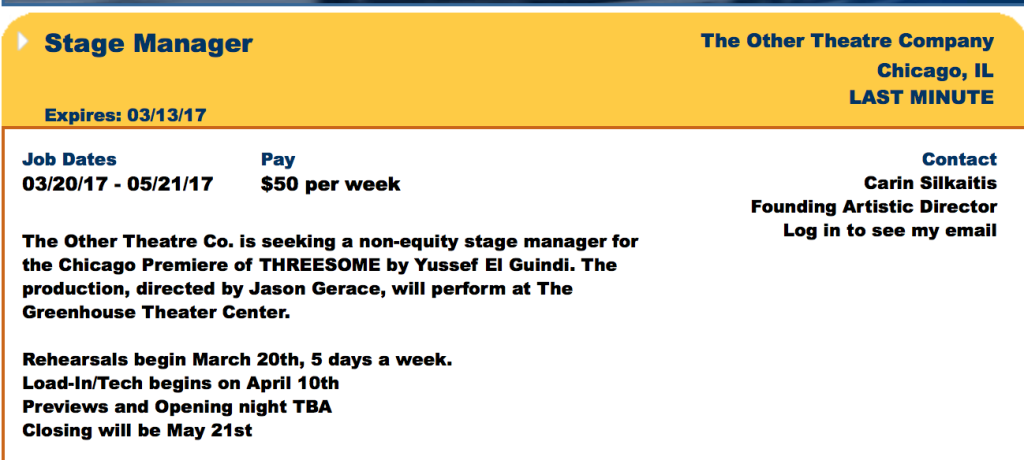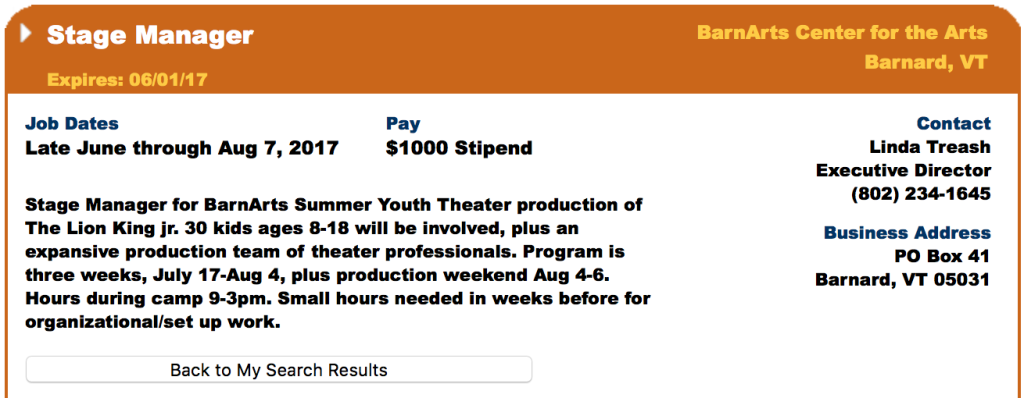Stage management can be a pretty rough gig. It’s difficult to find any work at all and even when you do, the vast majority of it is stipend work that is wildly underpaid. As a matter of fact, if you are offered a stipend and then divide it based on a 40 hour work week (which is almost certainly a lie, it will probably be a minimum of 48 hours, because the theater world doesn’t think it needs a 2 day weekend, and the lie is furthered because as the stage manager you will likely do at least one extra hour of paperwork, and your lunch break, if you get one, will be shorter because you’ll need to have the room reset and ready to go for when the actors return).

$50 per week for rehearsals that are 5 days a week. Even if you’re only working 1 hour each of those days (which I’d wager you are not), you’d be making less than Chicago minimum wage, which is $10.50.
Additionally, while lots of other jobs can multitask (directors and designers take on more than one show at a time, actors’ schedules usually include days they aren’t called and can pick up more work), the stage manager is there 100% of the time. If you’re very lucky and well connected, you could be in rehearsals for one show and running another show in the evening, but that is really rare.
While there are some decent jobs you can land as a resident stage manager, most gigs that pay a livable wage are on the road, which can also wear you down. Maybe you’re sick of all the travel. Maybe you want to start a family. Maybe you need to move home because of something happening with your family. There are a lot of reasons to move on.

Stipend is just another word for screwed. Although as this breaks down to around $9.50/hr (not including that vague “small hours” notice) it actually pays pretty well, as far as stage management gigs go. Good thing any idiot can be a stage manager and it’s not highly specialized skill or anything.
So what can you do once you’re ready to move on to a life that has some more balance and a better financial bottom line?
I asked a friend and former colleague, Ron, what prompted his move out of stage management:
I didn’t necessarily want to leave Stage Management but I also wasn’t necessarily committed to just Stage Management. My career started in Disney entertainment as a performer fresh out of high school and then I moved into hourly supervision, then scheduling, and then entertainment management. Honestly the only shows I stage managed were the fireworks show and music acts. I was at Disney for 12 years once all was said and done. The first time I was exclusively calling a “traditional” show was when I went to Sight & Sound in Pennsylvania. After that I went to Holland.The job I have now is Director of Exhibits, Art Education, and Collections at the Festival of Arts / Pageant of the Masters in Laguna Beach. I run an art show featuring local artists. We also have the theatrical spectacle that is the Pageant of the Masters but actually I don’t do anything with that. The art show is 2 months long which is an anomaly as most are just for a weekend. When I was hired they were debating if they were looking for someone with an entertainment and event background or someone with an art/gallery background. The art show is juried and features 140 local artists. I’m also in charge of partnering with the Orange County Department of Education for our Junior Art exhibit which features 10-15 students from each grade pre-k – 12 from across Orange County. I am also in charge of our Art Center featuring art workshops and art classes. And to top it all off I’m in charge of our Permanent Art collection and our off-site exhibitions. I have to note that I have zero art background or degree but did come into the job with general art knowledge and have learned a lot about art from the job.SM skills used on the job:I’m in charge of 140 fine artist and while they are not performing artists the passion, quirks, and personalities can be very similar. One big difference is there are many fine artists who are reclusive and in no way want to be in the spot light (they like if their art is but not them personally). Some do enjoy the spotlight but there is a good chunk that introvert and hermit whenever possible.PlanningOrganizingDelegatingMulti-taskingCalmness under pressureProblem solvingConfidence in decision making
If you’re as stage manager reading this, it should nearly go without saying that you can shift into the real world pretty well. You can apply for people management jobs because you’ve already handled the craziest of them all. You can apply for office jobs because you’re very competent with a computer and analyzing source materials (scripts) and breaking them down into smaller, more useful paperwork (every plot you’ve ever made).
Some professions to look into include:
- Event Management
- Wedding Planning
- Receptionist
- Accountant
- Real Estate Agent
- Property Management
- Project Management
There are also a few gigs in the arts that do pay a little better.
Production Management
Most large production venues have a Production Manager. This job will still have longer hours than your usual 9 to 5, but it does also come with a pay bump that actually matches real world wages. This is also a good way to get exciting things like health benefits and retirement saving packages. As a matter of fact, both companies I did brief Production Management stints had, respectively a 401k (vested after 3 years – I made it to 1) and a pension (yup, that says pension – vested after 5 years, again, I made it to 1).
To be a happy Production Manager, you really need to be comfortable with the technical side of running a theater. You become the liaison point for any outside companies booked in the space and any productions produced by the venue. You answer all of their technical needs, create and confirm production schedules, set the necessary crew calls, hire crew and any other number of tasks to make sure the theater keeps running smoothly.
House Management
If you were always more of a people person than a technical person, moving into a position like House Management might be more your speed. These managers oversee the Front of House. They manage the ushers and anyone else maintaining the lobby and overseeing the patrons.
Teaching
In many states, if you already have a Bachelor’s degree, with an additional year or two of college, you can find programs that will give you your teaching certificate and you can become a high school theater teacher.
If you’re really ambitious, you can go back to school for an M.F.A. or PhD and become a professor – though, be warned (as I have been), that this is likely just to be a different difficult lifestyle. It’s very difficult to get a tenured professor track and if you’re hoping to settle down in one specific place, that’s going to make it even harder.





I had similar concerns when I quit my career as a concert promoter. It turns out there are tons of transferable skills, across a variety of fields. Speaking with a career counselor was incredibly eye-opening and helpful. Plus, the work ethic you have gained by working in entertainment is an asset anywhere you go!
Kate @ Cashville Skyline recently posted…How I Boosted My Credit Score Above 800
Wow, this is so illuminating! I think you can definitely transfer those skills elsewhere to earn more pay.
Melanie @ Dear Debt recently posted…Why You Need to Pay Off Debt (Now!)
I don’t think anyone sticks with stage management for the pay. But, yeah, fortunately the skills are pretty transferable – you just have to get hiring companies past the initial point of just seeing you as some shiftless artist.
That’s what I am dealing with now. I’ve had a pretty successful SM career and now how do I get past the first round?
Yeah, I think all periods of transition can be pretty rough. Every time I stop stage managing, it doesn’t go very well. I always wind up missing it.